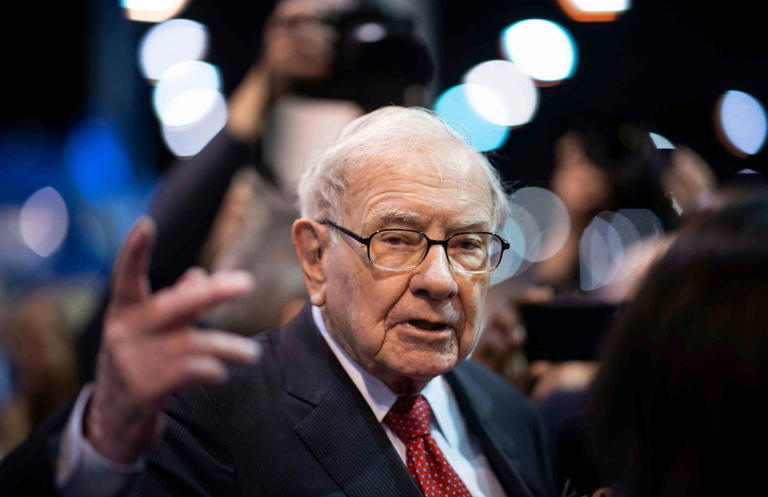Key Takeaways:
- As of the end of 2023, Warren Buffett’s Berkshire Hathaway did not hold any stake in Nvidia.
- Berkshire Hathaway has historically been cautious about investing in technology companies, preferring businesses with simpler operations.
- Despite its reluctance towards tech investments, Berkshire eventually invested in Apple in 2016 and Amazon in 2019, after significant gains in their share prices.
- Nvidia’s shares have surged over the past year, more than tripling in value, driven by consistently exceeding growth expectations.
- Last week, Nvidia briefly achieved a market capitalization exceeding $2 trillion, marking a remarkable milestone for the company.
Warren Buffett’s decision not to own a stake in Nvidia Corp. (NVDA), despite its significant market presence and acclaim from some quarters as “the most important stock on planet earth,” reflects his adherence to fundamental principles of investing. As the chief executive officer of Berkshire Hathaway, Buffett is renowned for his value investing approach, which prioritizes simple and easy-to-understand businesses with prices that are considered low based on intrinsic worth.
Unlike some investors who may be swayed by the excitement surrounding emerging technologies like artificial intelligence, Buffett typically avoids investing in newcomers and instead favors established companies with enduring competitive advantages. This approach has led him to focus on companies such as Coca-Cola and American Express, which have demonstrated stability and resilience over the long term.
Buffett has openly acknowledged his tendency to steer clear of tech stocks, preferring to invest in industries and businesses that he can readily grasp and evaluate. Berkshire Hathaway’s most recent 13F filing for the fourth quarter revealed that the conglomerate held no stake in Nvidia, aligning with Buffett’s conservative investment strategy.
While Berkshire Hathaway has made significant investments in companies like Apple and Amazon.com in recent years, Buffett has admitted to missing out on earlier opportunities with these tech giants. He expressed regret for not recognizing Amazon’s potential sooner, acknowledging that it was a costly oversight for Berkshire.
Considering Nvidia’s remarkable growth trajectory and soaring stock price, some observers may speculate whether Buffett will regret not investing in the chipmaker. Nvidia’s stock has experienced exponential gains, surpassing $2 trillion in market capitalization and solidifying its position as one of the most valuable companies in the United States. However, Buffett’s investment philosophy prioritizes long-term value and stability, suggesting that he remains focused on companies that align more closely with his established criteria for investment.
Warren Buffett’s cautious approach to investing, characterized by a reluctance to dive into trendy or speculative stocks, suggests that Nvidia may not align with his investment philosophy. According to Wedbush Securities tech analyst Dan Ives, Nvidia’s focus on artificial intelligence (AI) and its high-growth potential may not fit within Buffett’s value-centric model.
Ives believes that while Buffett may not currently view AI-focused companies like Nvidia as suitable investments, he recognizes the significance of the AI Revolution and may indirectly participate in it through holdings such as Apple.
In his annual letter to shareholders, Buffett reiterated Berkshire Hathaway’s commitment to investing in businesses with strong and enduring economics. However, with over $167 billion in cash reserves, Buffett acknowledges the challenge of finding attractive investment opportunities that can significantly impact Berkshire’s portfolio.
Buffett emphasizes the limited pool of companies capable of moving the needle for Berkshire Hathaway, many of which have already been extensively analyzed by investors. He underscores the importance of finding attractively priced opportunities, tempering expectations for “eye-popping performance” from investments.
Despite Berkshire Hathaway’s historical aversion to technology stocks, it made significant investments in both Apple and Amazon in recent years. Apple has become Berkshire’s largest single stock holding, with over 900 million shares by the end of the fourth quarter, while the company acquired shares in Amazon in 2019, a move that came after Charlie Munger, Buffett’s business partner, had expressed skepticism about the complexity and uncertainty surrounding Amazon.
Munger, known for his cautious approach, had previously refrained from investing in Amazon, citing its complexity as unsuitable for his temperament. Despite the hype surrounding artificial intelligence (AI), Munger remains skeptical about its potential, expressing confidence in traditional intelligence.
At Berkshire’s annual meeting, Munger questioned the excessive hype around AI, preferring the reliability of conventional intelligence. Buffett, while acknowledging the remarkable capabilities of AI demonstrated by technologies like ChatGPT, expressed reservations about its implications and the irreversible nature of technological advancements. He cautioned against the unforeseen consequences that often accompany the adoption of new technologies.
